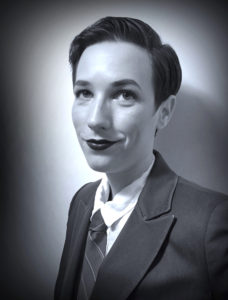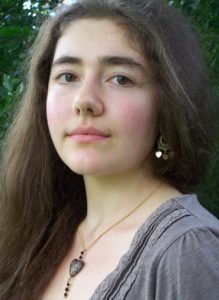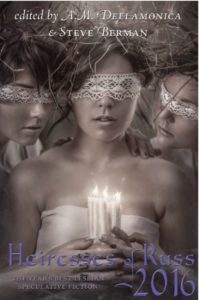 I have been trying for some time to get a few of my favorite authors to come here to my blog and talk about a lucky break in their careers. Unexpected forks in the road, weird bits of random serendipity… you name it. Writers work hard to achieve success, but every now and then something happens that they couldn’t ever predict or reproduce. Some of those moments, I think, must have good stories in them.
I have been trying for some time to get a few of my favorite authors to come here to my blog and talk about a lucky break in their careers. Unexpected forks in the road, weird bits of random serendipity… you name it. Writers work hard to achieve success, but every now and then something happens that they couldn’t ever predict or reproduce. Some of those moments, I think, must have good stories in them.
(And what’s more, they don’t even have to come packed with a moral lesson! Nobody’s going to say: New Author, you should try to get a concussion at a con! Or: Hey, car trouble is the way to go if you want to hit the NY Times Bestseller List!)
But the thing is, people (and perhaps especially writers) are superstitious. To some extent it feels like inviting bad luck to go crowing too loudly about good luck. It has taken me awhile to find someone who was willing to take this particular interview plunge. And how fitting that the trailblazer is Lara Elena Donnelly, whose audacious upcoming novel Amberlough is out on February 7th. This book is going to seem to many of you as though it was written just yesterday, because while it does not quite happen on Earth, or even in the United States of America, it is nevertheless a chilling capture of so many things we have lately come to fear.
Lara says:
Generally, you wouldn’t count a cracked exhaust manifold as a lucky break. Not in your writing career, or in your life as a whole. But if not for a cracked exhaust manifold, my debut novel Amberlough might not be coming out in February.
The sequence of unlikely events and circumstances that led me to this moment began on a winter day when blizzard warnings were flying thick and fast as the snow would later in the evening. I got up early, got in my mom’s car, and we drove to Michigan.
I was incredibly excited, for two reasons. One: even though I wasn’t sick, I was getting out of school. Two: I was about to meet my idol.
Holly Black’s urban fantasy novel Tithe had me rubbing four leaf clovers on my skin and staring through hollow stones, devouring any other fairy lore I could get my hands on. And I had read, on her LiveJournal (yes, LiveJournal) that she would be teaching at the Clarion Youth workshop in Ann Arbor, Michigan, just a couple of hours from my hometown. My mom pulled me out of school and put me in the car.
It was at Clarion Youth that Holly mentioned a sci-fi, fantasy, and horror workshop for teens in Pennsylvania, called Alpha, where Tamora Pierce taught every year. If you haven’t heard of Tamora Pierce, quick recap: she’s written dozens and dozens of fantasy novels featuring young women as knights, mages, cops, and spies. Her characters get menstrual cramps while jousting, use birth control so pregnancy won’t interrupt their espionage missions, and have frank discussions about sex with their partners in the midst of quests in the realm of the Gods. She writes fantasy with female characters who have the practical concerns of real-life women. She is amazing.
But Holly couldn’t remember the name of the workshop, and over the next year—which included my first summer job, my first love, and my first novel (a glorious disaster, if you’re wondering)—the idea of it leaked out of my overheated teenage brain. I found a workshop in Scotland I wanted to go to. I bussed tables and saved money. My mom sold home-baked bread at the farmer’s market, and saved money. And then her car broke down.
See, we got to the car eventually.
A cracked exhaust manifold ain’t a cheap fix. Scotland was off the table. But my mom, determined I would get my summer workshop, remembered Holly Black saying something about Pennsylvania, and Tamora Pierce.
The Alpha SF/F/H/Workshop for Young Writers was my luckiest break of all. Taught by a combination of visiting authors and dedicated volunteer staff (all of them also writers), it was the first place I learned I could write and sell short fiction. The first place I heard about getting an agent, about writing a query letter, about how to submit my stories, why I should go to cons. The first place, in short, where writing was treated as a profession and I was treated as a budding professional.
It was also where I heard about the Dell Awards.
The Dell Magazine Awards for Undergraduate Excellence in Science Fiction and Fantasy are awarded at ICFA, the International Conference on the Fantastic in the Arts, every year. The important thing about this award: All finalists, not just the winner, get free registration at the conference. If you can get yourself to Florida, you get a formal introduction to the field of SFF. You meet people like Kit Reed and Ted Chiang and Peter Straub and if you’re like me at age 19, you have no idea who they are, and when you learn you’re petrified. But you keep going back.
After I graduated from college, I wanted to keep attending ICFA. But I was unemployed, like every other graduate after the financial crisis, and I couldn’t afford conference registration. I couldn’t afford a flight. I couldn’t afford a hotel. But I knew, because of Alpha, that cons were a good place to network. Sage advice from author Jeffrey Ford—attend the same con over and over again, until people know your face—made me eager to get back to Orlando, especially since I had a finished novel ready for submission.
So I asked for help. I set up a GoFundMe and my friends and family sent me to Florida for a sixth time. Where, in an incidental conversation, I met Diana Pho, an associate editor at Tor, and mentioned my book.
“That sounds really interesting,” she said. “You should send that to me when it’s done.”
Reader, I finished revisions in a week. And after nearly a year of back-and-forth, revisions, agent queries, abject panic and brief flashes of ecstasy, I signed a contract.
Without that cracked exhaust manifold, I’d have ended up in Scotland instead of at Alpha. That’s not to say I wouldn’t have sold a book, eventually, but it might not have been Amberlough. It might not be coming out on February 7, 2017, or currently available for pre-order. Without that cracked exhaust manifold, I might not be turning this hypothetical into a bald-faced plug for my debut novel.
My mom’s still driving the same car, by the way. Honda Civics are tough little bugs.
The all-singing, all-dancing Lara Elena Donnelly is a graduate of the Alpha and Clarion writers’ workshops. Her work has appeared in venues including Strange Horizons, Escape Pod, Nightmare, and Mythic Delirium. Her debut novel, vintage-glam spy thriller Amberlough, drops on February 7, 2017 from Tor Books, but you can pre-order it now. Lara lives in Manhattan, but you can find her online at @larazontally or laradonnelly.com.
About this series: If I can find anyone bold enough to brag about their good fortune, Lucky Break will be another of my occasional interview series with authors, about bolts from the blue that aided their careers. If I can’t, I hope you and I will continue to enjoy new essays like those in my series: The Heroine Question, Let Me Inksplain, and What We Inherited.





